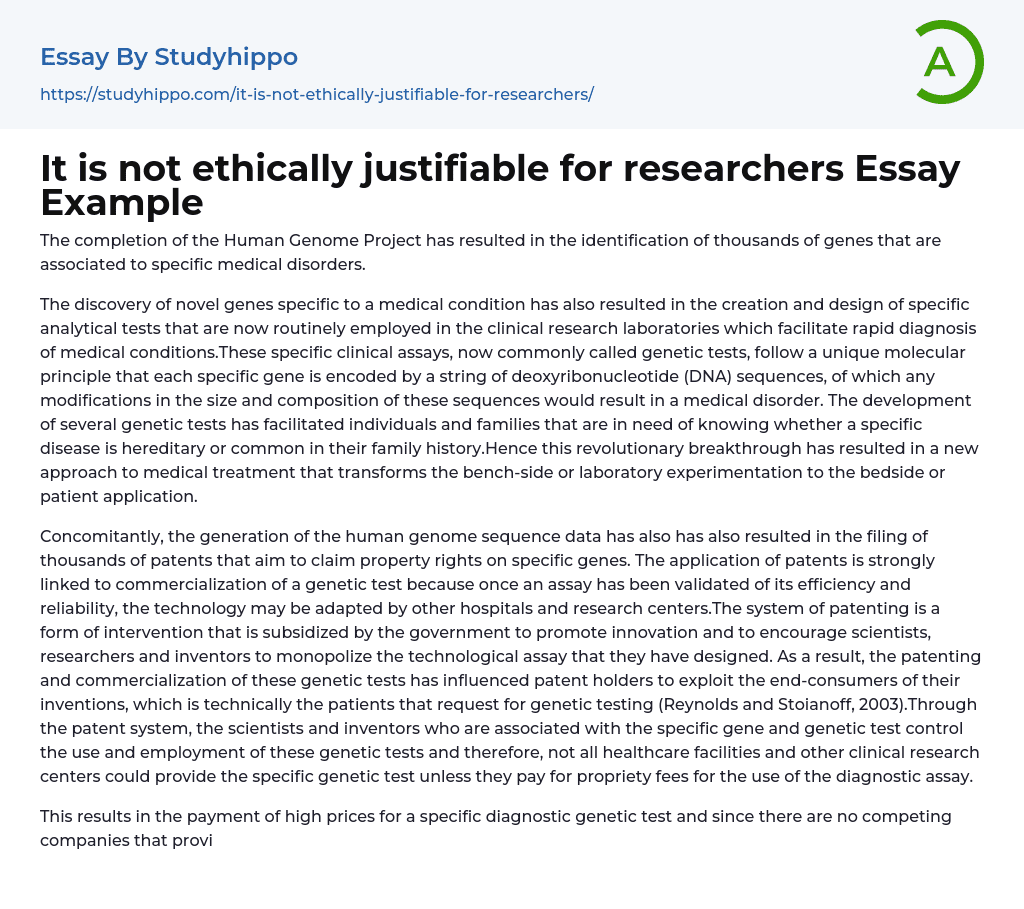As a result of the completion of the Human Genome Project, multiple genes associated with specific medical conditions were identified.
The development of targeted analytical tests, known as genetic tests, has been facilitated by the identification of new genes that are related to medical conditions. These genetic tests are extensively used in clinical research laboratories and allow for swift diagnoses by detecting alterations in DNA sequences that encode particular genes associated with medical conditions. Genetic testing has made it simpler for individuals and families to determine if certain illnesses are hereditary or not, revolutionizing medical treatment by allowing laboratory research findings to be directly applied to patient care.
Along with the generation of human genome sequence data, many patents have been filed claiming ownership of specific genes. Patents are important for commercializing genetic tests, as validated assays can be u
...sed by other research centers and hospitals. Patents encourage inventors and researchers to monopolize their technological assays by subsidizing their intervention. However, the commercialization of genetic tests has led to exploitation of patients who request them. The patent system gives control of the genetic tests to scientists and inventors associated with specific genes, requiring healthcare facilities and research centers to pay for propriety fees if they wish to provide the tests.
Certain diagnostic genetic tests may have high prices that are unethical due to patent and property rights restrictions. Lack of competition from other companies offering the same test could be a reason for these high prices, which can prevent public access to important genetic diagnostic testing. Myriad Genetics, Inc., in partnership with Genetic Technologies of Australia, holds a gene patent that exemplifies this situation.
Myriad Genetics acquired the ownershi
rights for BRCA1 and BRCA2 genes in 2003, which are linked with familial breast and ovarian cancers. Consequently, only authorized genetic laboratories based in Salt Lake City, Utah can globally carry out the test due to a patent that monopolizes breast cancer genetic testing. This hampers the Human Genome Project's objective of transforming laboratory discoveries into molecular diagnostic tools at patients' bedside. Gene patents increase the cost of genetic tests by two- to three-fold as private hospital and pharmaceutical company research expenses are included; government health agencies cannot provide reduced or subsidized prices due to these patents. Furthermore, other clinical laboratories may be prevented from enhancing or modifying the test under exclusive research investigation by the patent holder (Bounpheng et al.).
Myriad Genetics might be the sole entity capable of conducting additional research on a simpler, more efficient, and cost-effective BRCA1 genetic test. Nonetheless, if Myriad Genetics fails to enhance its patented BRCA1/BRCA2 genetic test, other nations will have no choice but to depend on the current form of genetic testing for breast and ovarian cancer. The monopolization of genes and their corresponding genetic tests by scientists and researchers has caused concern among various countries (Andrews, 2002; Scully, 2003).
The Medical Research Council of Australia and the National Institutes of Health of the United States suggest that individuals requiring the BRCA1/BRCA2 genetic test should have access to it to improve patient care. These countries are also reviewing patenting and property rights systems to maximize benefits for the public. (Andrews, 2002)
The article titled "Rapid inexpensive scanning for all possible BRCA1 and BRCA2 gene sequence variants in a single assay: Implications for genetic testing" by Bounpheng M, McGrath
S, Macias D (2003), presents findings on the efficient detection of BRCA1 and BRCA2 gene sequence variants through a cost-effective and quick scanning process. The study's results may have significant implications for genetic testing. The text is contained within a paragraph tag.The text, including and their contents, is as follows:
Genet. 40:e33. Reynolds R and Stoianoff N authored a book on intellectual property text and essential cases titled "Intellectual Property: Text and Essential Cases" published by Federation Press in Sydney in 2003. Another book on patent law and genetic testing titled "Myriad Genetics: Patent Law and Genetic Testing" was written by Rimmer M in the same year.
Eur. Intellect. Prop. Rev. 25:20-33 includes examination questions 1.
What was the genetic test used in the study of gene patents? Options include prostate cancer, lung cancer, breast cancer, and bone cancer. Additionally, which global scientific venture led to the discovery of numerous genes linked to particular medical conditions? Options are the Human Genetic Project, the Human Genome Project, the Human Genome Sequence, and the Human Gene Project.
- Values of Life essays
- Ethical dilemma essays
- Normative Ethics essays
- Virtue Ethics essays
- Belief essays
- Deontology essays
- Moral essays
- Virtue essays
- Work Ethic essays
- Addiction essays
- Anatomy and Physiology essays
- Biodegradation essays
- Cancer essays
- Dental Care essays
- Disability essays
- Disease essays
- Disorders essays
- Health Care essays
- Infectious Disease essays
- Inquiry essays
- Intelligence Quotient essays
- Lung Cancer essays
- Medicine essays
- Neurology essays
- Nutrition essays
- Olfaction essays
- Physical Exercise essays
- Public Health essays
- Sex essays
- Women's Health essays
- World health organization essays
- Acceptance essays
- Age Of Enlightenment essays
- Child Observation essays
- Confucianism essays
- Conscience essays
- Critical Reflection essays
- Destiny essays
- Determinism essays
- Empiricism essays
- Environmentalism essays
- Epistemology essays
- Ethics essays
- Ethos essays
- Existence essays
- Existentialism essays
- Fate essays
- Free Will essays
- Functionalism essays
- Future essays




